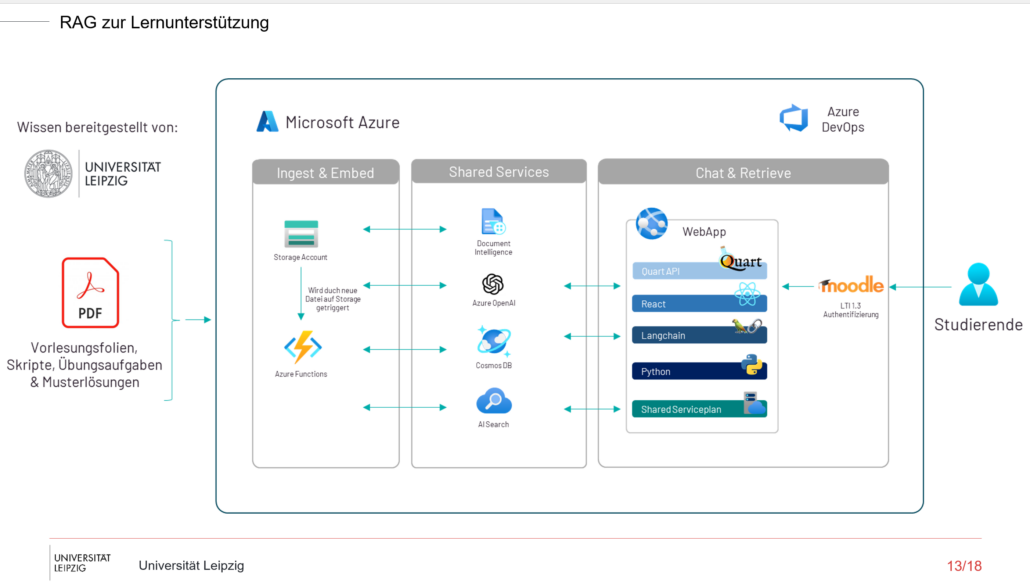How students can benefit from LLMs and chatbots
In modern higher education, the optimisation and personalisation of the learning process is extremely important. Technologies such as Large Language Models (LLMs) and Retrieval Augmented Generation (RAG) can play a supporting role, especially in complex courses such as law. A pilot project at the University of Leipzig, involving the university’s Computing Centre and the Faculty of Law, shows how these technologies can be successfully used in the form of an AI chatbot.
Background and Turing
In 1950, Alan Turing posed the revolutionary question in his essay “Computing Machinery and Intelligence”: Can machines think? He proposed the famous “imitation game”, now known as the Turing Test. In his view, a machine could be said to “think” if it could fool a human tester.
This idea forms the theoretical basis for many modern AI applications. We have come a long way since then, and new opportunities are opening up for students in particular to use AI tools such as LLMs to support their studies.
How does such a chatbot work for law studies?
The AI-based chatbot uses OpenAI’s advanced language models, called Transformers. These systems, such as GPT-4, can be augmented with the Retrieval Augmented Generation (RAG) method to provide correct answers to more complex legal questions. The process consists of several steps:
1. Ask a question (Query): Students ask a legal question, for example, “What is the difference between a mortgage and a security mortgage?”
2. Processing the query (Embedding): The question is converted into vectors so that it can be read and analysed by the LLM.
3. Search in vector database: The retrieval system searches a vector database for relevant texts that match the question. These can be lecture notes, case solutions or lecture slides.
4. Answer generation: The LLM analyses the data found and provides a precise answer. The answer can be provided with references, e.g. the page in the script or the corresponding slide in the lecture.
This is a powerful tool for law students, as they not only get quick answers to very individual questions, but also have direct links to the relevant teaching materials. This makes it easier to understand complex legal concepts and encourages independent learning.
Benefits for students and professors
Chatbots offer several benefits for teaching and learning in universities. For students, this means
- Personalised learning support: Students can ask individual questions and receive tailor-made answers.
- Adaptation to different subjects: You can easily adapt the chatbot to different areas of law, such as civil, criminal or public law. It can also explain more difficult legal concepts or help with exam preparation.
- Flexibility and cost transparency: Whether at home or on the move, the chatbot is always available and provides access to key information – via a Learning Management System (LMS) such as Moodle or directly as an app. In addition, monthly token budgets ensure clear cost control.
The use of LLMs in combination with RAG also has advantages for teachers:
- Planning support: AI tools can help to better structure courses.
- Development of teaching materials: AI can support the creation of assignments, teaching materials, case studies or exam questions.
Challenges in using LLMs
Despite the many benefits and opportunities offered by chatbots and other AI-based learning systems, there are also challenges that need to be considered:
- Resource-intensive: The operation of such systems requires a high level of computing power and costs.
- Provider dependency: Currently, many such systems rely on interfaces to external providers such as Microsoft Azure or OpenAI, which can limit independence from universities.
- Quality of answers: AI systems do not always produce correct results. “Hallucinations (incorrect or nonsensical answers) can occur. Like all data-based systems, LLMs can be biased by the training data used. Therefore, both the accuracy of the answers and the avoidance of bias must be ensured.
The technical background: Azure and OpenAI
The chatbot above is built on the Microsoft Azure cloud infrastructure. Azure provides several services that enable secure and efficient computing. These include:
- AI Search: A hybrid search that combines both vector and full-text search to quickly find relevant data.
- Document Intelligence: Extracts information from PDF documents and provides direct access to lecture slides, scripts, or other educational materials.
- OpenAI: Azure provides access to OpenAI’s powerful language models. For example, the implementation uses GPT-4 Turbo and the ada-002 model for text embeddings to efficiently generate correct answers.

Presentation of the data processing procedure
Conclusion
The pilot project with the University of Leipzig shows how the use of LLMs and RAGs can support higher education. These technologies not only make learning processes more efficient, but also more flexible and targeted.
The use of Microsoft Azure also ensures secure and GDPR-compliant data processing.
The combination of powerful language models and innovative search methods offers both students and teachers new and effective ways to improve learning and teaching. The future of learning will be personalized, scalable, and always available.



